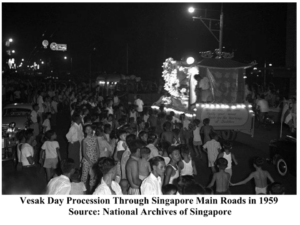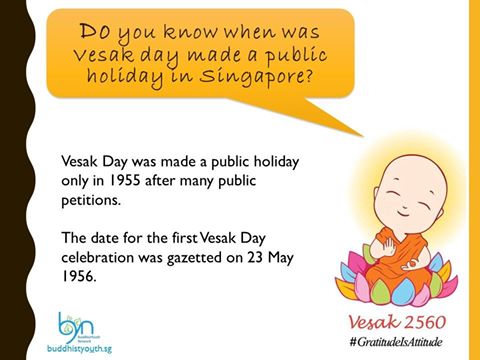The most significant achievement of Singapore Buddhist Federation-led activism was the movement to lobby for Vesak to be gazetted as a public holiday in Singapore. [1] Since the late 1940s, Buddhist community had tried to petition the colonial government for Vesak to be recognized as a public holiday. Singapore Buddhist Association, a Ceylonese Theravada group, submitted a petition on to Sir F.C.Gimson, the Governor of Singapore on October 14, 1947. The petition, however, was rejected on the ground that there was not enough practicing Buddhists to justify the increase in the number of statutory holidays in Singapore. To pursue the matter, a Vesak Holiday Committee with Venerable Hong Choon as the chairman was formed on May 11, 1949, to rally for their cause. Representatives of fifty-one Buddhist temples and associations congregated at the Victoria Memorial Hall to appeal for a public holiday for Vesak. The British governor again rejected their appeal.

Following the establishment of the Singapore Buddhist Federation in 1949, another petition was submitted to the Select Committee on Holidays Ordinance (Chapter 174) on February 27, 1950. Again, it was unsuccessful. [2] After several more failed attempts, the introduction of partial self-government in Singapore and the appointment of David Marshall as Singapore’s first Chief Minister in 1955 brought hopes to the quest for a Vesak public holiday. Singapore Buddhist Federation rallied Buddhists of different traditions to submit a petition to Chief Minister Marshall. Finally, on June 15, 1955, the Council of Ministers declared Vesak as a public holiday in place of Whit Monday. [3]
__________________
[1] Vesak is an important Buddhist festival that commemorates the birth, enlightenment, and parinirvana of the Buddha.
[2] Y.D. Ong, Buddhism in Singapore: A Short Narrative History (Singapore: Skylark Publications, 2005), 88-90.
[3] Ibid., 92.
Jack Meng-Tat Chia, “Defending the Dharma: Buddhist Activism in a Global City-State,” in Singapore: Negotiating State and Society, 1965-2015, ed. Jason Lim and Terence Lee (New York: Routledge, forthcoming 2016)
#Vesak2560 #GratitudeIsAttitude #BuddhistYouthNetwork
